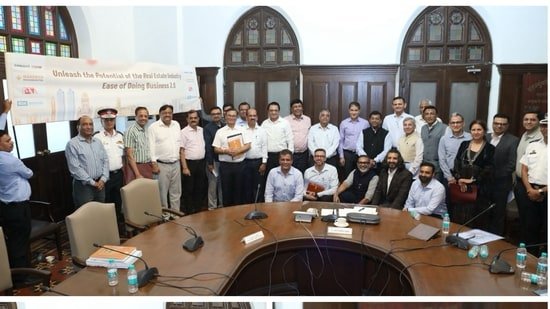Real estate developers from associations including CREDAI-MCHI, NAREDCO, BDA, and PEATA met with Brihanmumbai Municipal Corporation (BMC) Chief Bhushan Gagrani on October 24 to discuss key sector challenges and proposed a rationalised premium payment plan under a 10:10:80 structure.
Among the key recommendations made during the interaction was a call to rationalise the premium payment schedule through a 10:10:80 structure, where 10% of the premium would be paid at the time of approval, another 10% at the stage of Commencement Certificate (CC), and the balance 80% at the Occupation Certificate (OC) stage, CREDAI-MCHI, an apex body of real estate developers in Mumbai said in a statement.
Currently, developers are required to pay multiple premiums, including fungible FSI, open space deficiency, fire service charges, scrutiny fees, and development cess, either upfront or under deferment schemes with an interest rate of 12%. Since these payments are often levied at early stages of development, they put a heavy financial burden before any revenue is generated. The proposed structure aims to align payments with project cash flows, making them more practical and sustainable without affecting civic revenues, said the statement.
What is a premium?
A premium refers to the various charges developers pay to civic authorities for project approvals, additional construction rights, or extra built-up area. These include payments for fungible FSI, open space deficiency, increased ground coverage, and common areas such as lobbies, lift wells, and staircases. In Mumbai, developers pay over 20 different types of premiums, which together account for nearly 20–30% of a project’s total cost.
Dedicated committee for the real estate sector
According to the statement, BMC Chief Bhushan Gagrani announced the formation of a steering committee comprising representation from CREDAI-MCHI, NAREDCO, PEATA, and BDA, along with officers from various departments of MCGM, including the fire office, which would meet fortnightly to discuss various key issues, policy matters and opportunities for Mumbai’s real estate sector.
“The meeting would be chaired by Deputy Chief Engineer (Office of the Municipal Commissioner) Chandrashekhar Undge, and BMC Commissioner Bhushan Gagrani assured that he would also partake in such meetings on a monthly basis. This structure will ensure that key decisions and recommendations are tracked, implemented, and reviewed regularly,” according to the statement.
“It is heartening to see all real estate associations come together with a unified voice. Our goal is to collaborate with the BMC to establish structured mechanisms that facilitate regular dialogue, expedite the resolution of issues, and enhance transparency in processes. The proposed 10:10:80 premium payment model is a fair and practical approach that aligns payment timelines with actual project progress and cash inflows whilst being revenue neutral from the administration standpoint,” said Sukhraj Nahar, president, CREDAI-MCHI.
Also Read: Mumbai Real Estate: Developers waive floor-rise premiums to attract buyers amid surging inventory
“The real estate industry is one of Mumbai’s key growth drivers, and regular engagement with the civic authorities is vital to unlock its full potential. We look forward to building on this momentum and ensuring that our suggestions translate into tangible improvements for both the industry and the city,” said Rushi Mehta, secretary, CREDAI-MCHI.




